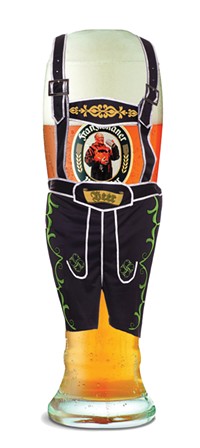Sips of Oktoberfest
What to drink with brats, 'kraut, spätzle and other German delights
By Ted Scheffler @critic1If, like me, you didn't get the opportunity to attend Munich's raucous Oktoberfest with 6.3 million other revelers this year, or even the somewhat smaller Snowbird Resort Oktoberfest, both of which ended recently, all is not lost. You could do what I did to soothe my autumnal cravings for brats and brews: throw your own Oktoberfest celebration.
Each year when there's a fall chill in the air, I make up a big batch of choucroute garnie, the Alsatian dish that holds many of the flavors of Oktoberfest in one pot. There are smoked meats (like ham hocks, sliced ham and pork chops) along with sauerkraut, spuds (optional), bacon and, of course, sausages (bratwurst, weisswurst, frankfurters and such). I always serve my choucroute garnie with buttery homemade spatzle, the small egg & flour dumplings that translate from the Swabian dialect to "little sparrows."
The question then is: What do you drink with a fairly hefty dish that incorporates tangy sauerkraut flavors, smoky meats, mild sausages and potatoes, hints of juniper and caraway, along with a side of buttered pasta? Well, my advice would be to go light. And I don't mean Bud or Coors Light. I would opt for a light style of beer such as a good lager or hefeweizen, or a relatively lower alcohol wine such as Riesling or Pinot Gris. I took the opportunity of my recent choucroute garnie bash to try out various Oktoberfest-style sips.
In Strasbourg—the spiritual home of choucroute garnie—grated apple is sometime added at or near the end of cooking. The apples add a crisp, tangy sweetness to the overall dish that simply begs for a good glass of Riesling alongside. The apples, plus the fact that the liquid cook the choucroute garnie in is Riesling, makes the wine a slam-dunk as a drinking partner.
Of course, Riesling runs the gamut from über-dry to teeth-tingling sweet. To balance the saltiness of the smoked meats and the tangy aspects of the sauerkraut, I recommend a Riesling with a bit of residual sugar, like Ste. Chapelle Chateau Series Riesling ($5.99) from Idaho, which has pear and stone fruit flavors that serve as a slightly sweet counterbalance to the choucroute garnie. For something in a drier style, check out the Alsatian Willm Riesling Reserve ($14.99) or Willm Pinot Gris Reserve ($15.99) for two tantalizing sips of Alsace alongside the iconic Alsatian meal. Even better, crack open a bottle of Kuentz-Bas Alsace Blanc ($14.94), an age-worthy Alsatian white wine composed of Sylvaner, Auserrois, Muscat and Chasselas juice. It's bone-dry, but with citrus flavors and a slight smokiness that is a good match for smoked sausages and ham.
On the beer front, I'm always a fan of the economically priced Lev Lion Pilsner ($2.10/500ml) from the Czech Republic, and equally fond of dependable Spaten Premium Lager ($1.89/355ml), a lager that has satisfied Münchners for more than six centuries. Speaking of old beer, I also really like to sip Weihenstephaner Original Premium ($3.99/503ml), the Munich helles-style lager, made by the world's oldest brewery. It tastes lean and light, with a slightly grassy/herbal quality.
For wheat beer, I'd turn to Czech Primátor Hefe-Weizen ($2/500ml) or Franziskaner Weissbier ($2.59/500ml) from Munich. Both of these excellent wheat brews have a gorgeous mouthfeel and citrus notes that work beautifully with choucroute garnie. I'd also add a couple of seasonal Oktoberfest beers to the roster: Festbier from Gordon Biersch ($1.87/355ml) and Ayinger Oktoberfest-Marzen ($3.11/500ml). Prost!
More by Ted Scheffler
-
Flavor on the Western Front
Nomad Eatery ups the ante for off-airport eats.
- Dec 13, 2017
-
Under the Christmas Tree
Holiday gifts for cooks, foodies and winos
- Dec 6, 2017
-
Spreading the Love
Amour Café creates simple yet scrumptious fare.
- Nov 29, 2017
- More »





